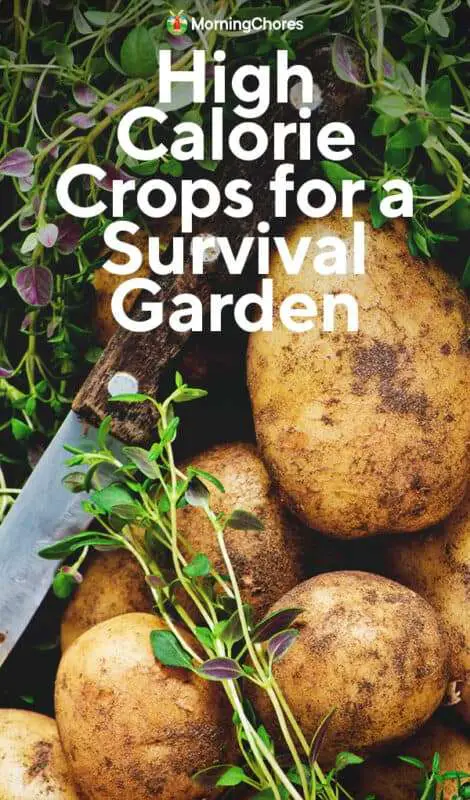If you’re looking to become more self-sufficient and sustain yourself with nutritious food, growing high-calorie crops is the way to go. These crops, packed with essential vitamins, minerals, proteins, carbohydrates, and fibers, offer a significant calorie count to keep you nourished. Imagine having an abundance of sunflowers, soybeans, amaranth, quinoa, and chickpeas in your garden. Along with wheat, pinto beans, avocado, rice, and many others, these crops not only provide sustenance but also have a relatively long shelf life, making them easy to store. To maintain a balanced diet, it is recommended to grow at least 2-3 high-calorie crops, taking into consideration the specific growing conditions, maintenance costs, and personal preferences. Plus, certain crops like sunflowers and soybeans can even benefit your livestock. So, why wait? Start planting these nutrient-dense crops and embrace the journey of self-sufficiency.
The Importance of Growing High-Calorie Crops for Self-Sufficiency

Introduction
When it comes to self-sufficiency and sustenance, growing high-calorie crops is of utmost importance. These crops provide a rich source of essential nutrients, ensuring that you have a balanced and nutritious diet. In addition to their nutritional benefits, high-calorie crops are relatively easy to grow and store, making them an ideal choice for those aiming to be self-sufficient. In this article, we will explore the significance of growing high-calorie crops, their nutritional benefits, examples of crops you can grow in your own garden, storage and shelf life considerations, recommended number of crops for self-sufficiency, as well as specific growing conditions and techniques. We will also discuss the benefits of high-calorie crops for livestock and considerations to keep in mind when embarking on this endeavor.
Nutritional Benefits of High-Calorie Crops
High-calorie crops are packed with essential nutrients that are crucial for maintaining a healthy diet. These crops serve as a rich source of vitamins, offering a variety of options to meet your daily recommended intake. Additionally, they provide an abundance of minerals, such as iron, magnesium, and potassium, which are essential for various bodily functions. High-calorie crops are also a great source of proteins, promoting muscle growth and repair. Carbohydrates found in these crops provide the energy needed to fuel your body, while dietary fibers contribute to a healthy digestive system.
Examples of High-Calorie Garden Crops
If you’re considering growing high-calorie crops in your garden, there are several options to choose from. Sunflowers, with their large and nutritious seeds, are an excellent choice. Soybeans are another versatile crop that can be used in a variety of recipes and provide a significant amount of protein. Other high-calorie crops include amaranth, quinoa, and chickpeas, all of which offer an array of nutritional benefits while being relatively easy to grow.
Other High-Calorie Crops
In addition to the garden crops mentioned earlier, there are numerous other high-calorie crops that you can consider. Wheat, pinto beans, avocado, rice, yams, lentils, lima beans, yellow sweet corn, sweet potatoes, peas, potatoes, parsnip, and Jerusalem artichokes are just a few examples.

Storage and Shelf Life
One of the advantages of high-calorie crops is their ability to be stored for an extended period. When properly stored, these crops can retain their nutritional value and provide sustenance for an extended period. Factors such as temperature, humidity, and light exposure can influence the shelf life of these crops. Therefore, it is crucial to follow recommended storage techniques to ensure their longevity. Storing in cool, dry places and using airtight containers can help preserve these crops for months or even up to a year.
Recommended Number of High-Calorie Crops
To achieve a balanced and nutritious diet, it is recommended to grow at least 2-3 high-calorie crops. This allows for a diverse range of nutrients and ensures that you are meeting your dietary needs. By growing a variety of crops, you can create meals that are not only high in calories but also provide a wide spectrum of vitamins, minerals, and proteins.

Specific Growing Conditions and Techniques
Different high-calorie crops may require specific growing conditions and techniques to thrive. For example, sunflowers prefer warm weather and well-drained soil, while soybeans can tolerate different soil types but require full sun exposure. It is essential to research the specific needs of each crop you choose to grow to ensure optimal growth and yield. Consider factors such as climate, soil requirements, watering and irrigation needs, sunlight and shade considerations, pest and disease control methods, as well as harvesting and post-harvest practices.
Beneficial High-Calorie Crops for Livestock
Not only are high-calorie crops beneficial for human consumption, but some can also serve as an excellent source of nutrition for livestock. Crops like sunflowers and soybeans can be used as feed for animals. These crops provide essential nutrients for the livestock, promoting their overall health and productivity. Depending on the type of livestock you have, different crops may be more suitable. Consult with experts or do thorough research to determine which high-calorie crops would be the most beneficial for your specific livestock.

Considerations for Growing High-Calorie Crops
While growing high-calorie crops can be a rewarding endeavor, there are several considerations you should keep in mind. Firstly, assess the available space for cultivation to ensure that you have enough room for your desired crops. Consider the maintenance costs, including water, fertilizer, and pest control, to manage your crops effectively. Additionally, take into account your personal preferences and dietary needs. Choose crops that align with your tastes and dietary requirements to create a sustainable and enjoyable garden.
In conclusion, the importance of growing high-calorie crops for self-sufficiency cannot be underestimated. These crops offer a rich source of essential nutrients and calories, ensuring a balanced and nutritious diet. By choosing a variety of crops, you can create diverse meals that cater to your dietary needs. Whether you have limited garden space or are tending to livestock, there are high-calorie crops that can meet your requirements. Take into account the specific growing conditions, storage techniques, and personal considerations to successfully grow these crops and become self-sufficient in your food production.

